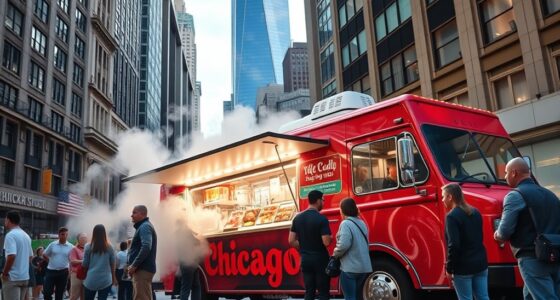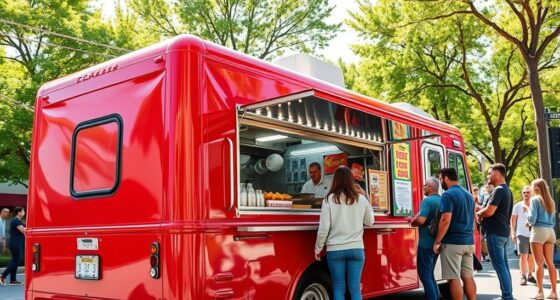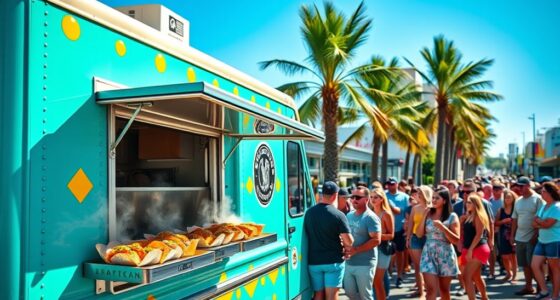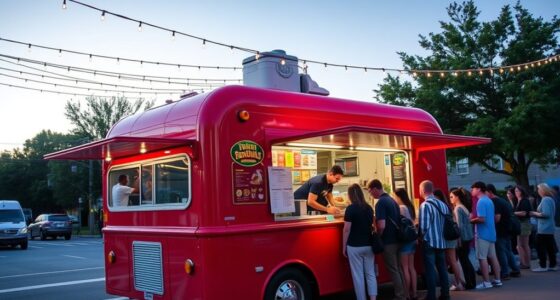To start a food truck in St. Paul, MN, you’ll need to understand the local food scene and community events to boost visibility. Secure permits, set up your kitchen, and budget for vehicle customization and insurance. Design a menu with popular dishes and use technology like mobile POS systems. Participating in local festivals and community gatherings helps grow your customer base. Keep exploring for detailed steps on turning your food truck dream into reality.
Key Takeaways
- Research local permits, licensing, and health regulations through St. Paul online portals to ensure legal compliance.
- Develop a detailed business plan focusing on community engagement, menu design, and local sourcing strategies.
- Budget for vehicle customization, kitchen setup, permits, insurance, and ongoing operational costs.
- Participate in local events like festivals and markets to boost visibility and build a loyal customer base.
- Explore available grants and funding options for small businesses to support startup costs and growth initiatives.
Vibrant St. Paul Food Scene
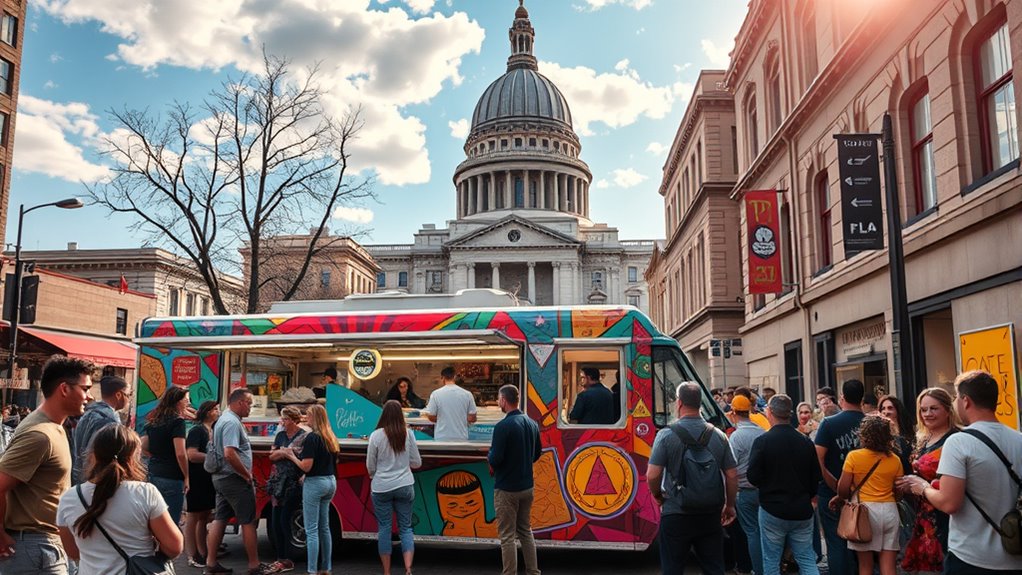
St. Paul boasts a vibrant food scene that welcomes new ideas and flavors. As a food truck owner, you’ll find ample opportunities for menu innovation, allowing you to stand out in a competitive market. The city’s diverse population encourages creative dishes that blend different culinary traditions. You’ll also want to focus on ingredient sourcing, prioritizing fresh, local, and sustainable products to attract health-conscious customers. St. Paul’s farmers markets and local suppliers make it easy to access quality ingredients, giving your menu authenticity and freshness. This combination of innovative menu options and thoughtful ingredient sourcing helps you build a loyal customer base enthusiastic to try new, exciting flavors. Embracing St. Paul’s dynamic food scene positions your food truck for success from the start. Curiosity about emerging food trends can inspire innovative menu ideas and keep your offerings fresh and engaging.
Understanding Local Requirements
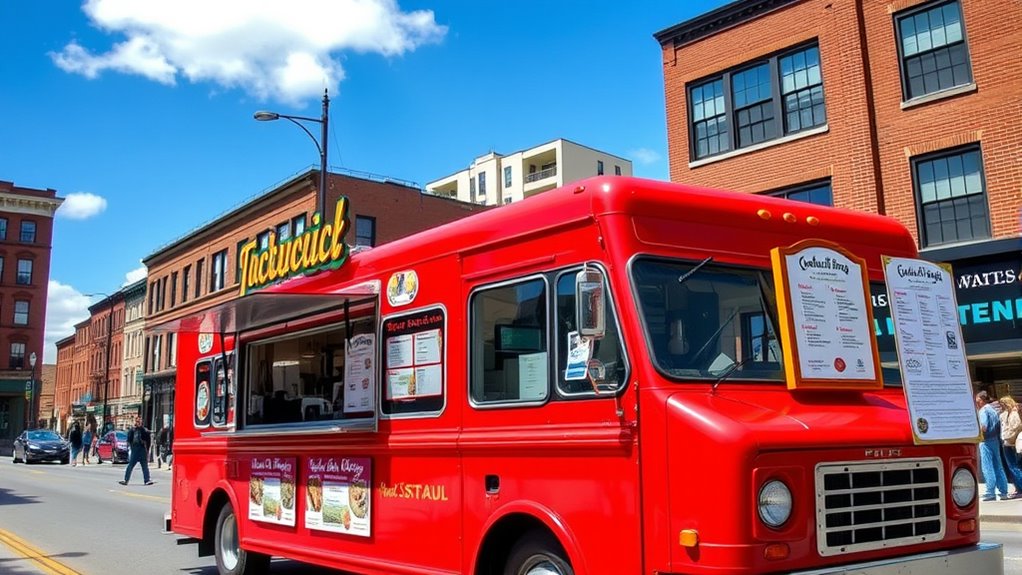
To start, you’ll want to familiarize yourself with the online permit application portals to make certain you meet all licensing requirements. You also need to understand sanitation standards and record-keeping rules to stay compliant. Additionally, locating designated truck parking zones is essential for operating legally and avoiding fines. Consulting local food safety regulations can help ensure you adhere to all health standards.
Online Permit Application Portals
Are you aware of how to navigate the online permit application portals for starting a food truck in St. Paul? The city’s digital licensing system simplifies permits online, allowing you to submit applications efficiently. First, visit the official St. Paul city website and create an account if you haven’t already. The portal provides clear instructions on required documents and fee payments. Be prepared to upload necessary forms and proof of insurance directly through the platform. This streamlined process helps you track your application status in real time. By using permits online, you avoid unnecessary trips to city offices, saving time and reducing hassle. Familiarize yourself with the portal early to ensure a smooth, quick licensing experience, so you can focus on launching your food truck business.
Sanitation Standards and Record-Keeping
Understanding local sanitation standards and record-keeping requirements is vital for operating a compliant and safe food truck in St. Paul. You need to follow specific food safety guidelines to prevent contamination and ensure customer health. This includes maintaining proper sanitation of all equipment, surfaces, and utensils, and regularly cleaning your truck. Record management is also fundamental; you must keep detailed logs of food temperatures, cleaning schedules, and employee training. These records demonstrate your commitment to food safety and help you quickly address any issues that arise. Staying up-to-date with local health department regulations ensures your food truck remains compliant. By prioritizing sanitation standards and accurate record-keeping, you protect your customers and your business’s reputation.
Designated Truck Parking Zones
Navigating the parking regulations for food trucks in St. Paul requires understanding designated truck parking zones. The city enforces specific parking regulations that restrict where you can park your truck. These zones are clearly marked and designated to guarantee smooth zone enforcement, preventing illegal parking and congestion. You must familiarize yourself with these zones to avoid fines or towing. Typically, truck parking is limited to certain areas and times, especially in busy districts or near residential neighborhoods. Always check local signage and city ordinances before parking. Adhering to zone enforcement helps maintain order and guarantees your truck complies with city rules. By respecting these designated zones, you’ll keep your business running smoothly and avoid unnecessary penalties.
Setting Up Your Base of Operations
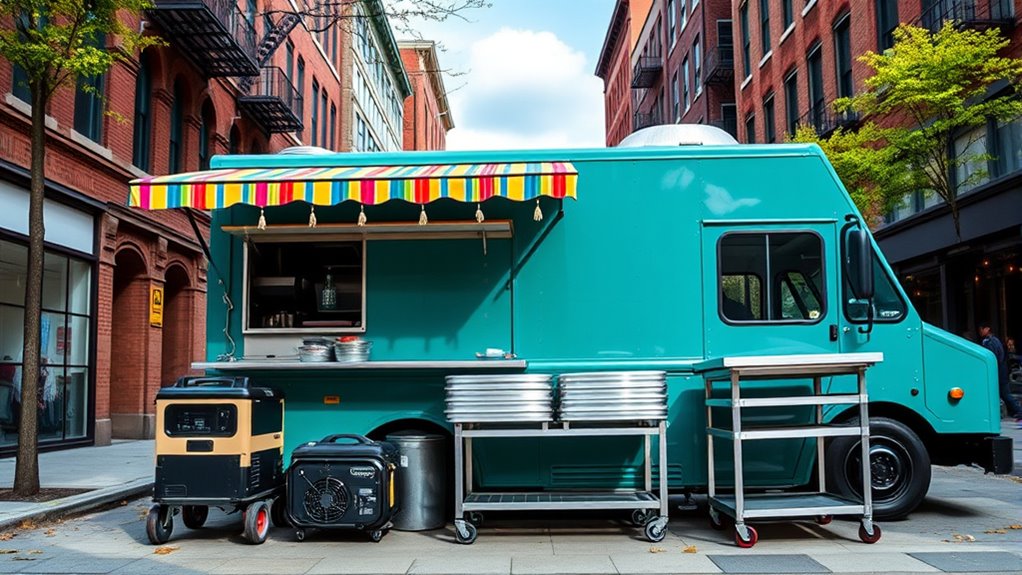
When setting up your base of operations, you’ll need to take into account shared kitchen licensing fees and how they fit into your budget. Choosing the right custom kitchen equipment is vital for efficiency and compliance with local health codes. Making informed decisions now will set a solid foundation for your food truck’s success in St. Paul. Additionally, understanding best practices for licensing and regulations can help ensure your business remains compliant and avoids costly penalties.
Shared Kitchen Licensing Fees
Are you aware of the licensing fees involved in setting up a shared kitchen for your food truck in St. Paul? Shared kitchen licensing fees can vary depending on the facility and the services included. You’ll need to review kitchen rental agreements carefully to understand costs, terms, and restrictions. These agreements typically outline the fees you’ll pay for using the space, which can be hourly, daily, or monthly. Keep in mind that licensing fees also cover health inspections and compliance costs. Some shared kitchens may include licensing fees in their rental rates, while others charge separately. Budget accordingly to make certain you meet all legal requirements without surprises. Understanding these costs upfront helps you plan your startup expenses more accurately and get your food truck business rolling smoothly.
Custom Kitchen Equipment Selection
Choosing the right kitchen equipment is essential to creating an efficient and functional setup for your food truck. Focus on custom kitchen design to maximize space and ensure smooth workflow. Select durable appliances that meet your menu needs and are easy to maintain. Prioritize equipment with accessible parts to simplify regular equipment maintenance and reduce downtime. Invest in high-quality items that stand up to the demands of a mobile kitchen, and consider flexibility for future menu changes. Properly chosen equipment enhances productivity and safety, making your operations more efficient. Remember, well-maintained equipment prevents costly repairs and keeps your truck running smoothly. Tailoring your kitchen setup with custom design elements and attention to equipment maintenance will give you a solid foundation for success.
Budgeting and Financing Your Food Truck

When planning your food truck, you need to contemplate costs like vehicle customization and ongoing expenses. You might also explore local small business grants to help cover initial costs. Don’t forget to budget for liability coverage to protect your business and guarantee compliance. Additionally, understanding ethical hacking principles can help you safeguard your digital presence and customer data as your food truck business grows.
Initial Vehicle Customization Costs
Customizing your food truck is a significant investment that directly impacts your startup budget. One of the biggest expenses is the vehicle wrap, which not only enhances your brand visibility but also protects your truck’s surface. Expect to spend between $2,500 and $5,000 for a professional wrap, depending on size and design complexity. Paint costs are another consideration—if you opt for a custom paint job instead of a wrap, prices can range from $1,000 to $4,000. Keep in mind that high-quality materials and skilled labor will increase costs but guarantee durability and a polished look. Budgeting accurately for these customization costs helps you avoid surprises and get your truck ready to hit the streets confidently.
Local Small Business Grants
Securing local small business grants can provide essential funding to help cover your food truck’s startup costs. These grants can ease financial pressure, allowing you to focus on establishing your food truck branding and building a customer base. Many local organizations and city programs in St. Paul offer grants specifically for small businesses, including food trucks. To increase your chances, develop a solid business plan highlighting community impact and economic growth. Use social media outreach to showcase your unique offerings and engage potential supporters. Demonstrating a strong local presence can make your application more appealing. Remember, grants don’t have to be repaid, making them an excellent resource to kickstart your food truck journey in St. Paul.
Liability Coverage for Food Trucks
Liability coverage is a crucial part of budgeting and financing your food truck, as it protects you from potential legal claims and financial setbacks. When you invest in food truck insurance, liability coverage ensures you’re covered if someone gets injured or if you cause property damage during operations. This type of insurance is essential for safeguarding your business assets and avoiding out-of-pocket expenses. Without proper liability coverage, a legal dispute could quickly drain your finances and threaten your future success. Be sure to review your food truck insurance policy carefully, understanding the limits and exclusions. Having comprehensive liability coverage not only provides peace of mind but also demonstrates professionalism to customers and partners, helping your food truck thrive in St. Paul’s competitive market.
Designing Your Menu and Pricing Strategy
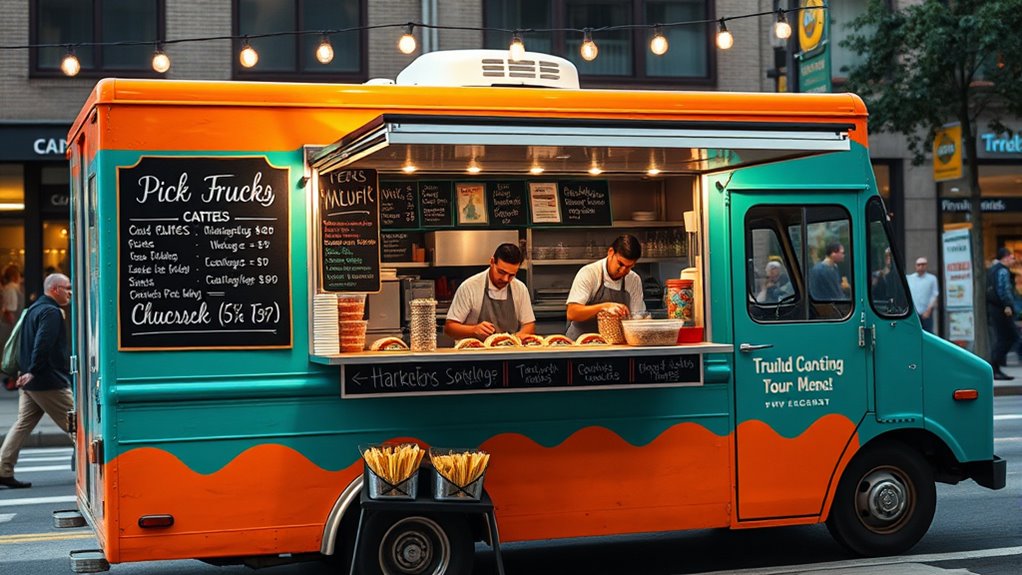
You need to create a menu that highlights your signature dishes while keeping costs in check. Consider how customization techniques can make your offerings stand out and attract customers. Balancing your menu items with accurate cost calculations helps make sure your pricing strategy remains profitable. Incorporating a variety of investment options can also help diversify revenue streams and stabilize your income.
Signature Dish Customization Techniques
Designing your menu and pricing strategy for signature dishes involves carefully balancing creativity with customer preferences and profitability. To stand out, focus on signature dish techniques that highlight your unique style. Incorporate flavor customization options, allowing customers to tailor dishes to their tastes, such as spice levels or ingredient swaps. This personalization creates a memorable experience and encourages repeat business. Use flexible recipes that can be easily adapted without sacrificing quality or consistency. When pricing, consider the added value of customization—customers often pay a premium for personalized options. Keep your menu clear and straightforward, emphasizing your signature dishes and their customizable features. This approach not only attracts diverse tastes but also boosts profitability by offering a distinctive, flexible menu tailored to your audience’s preferences.
Cost Calculation and Menu Balance
Effective cost calculation is essential for maintaining profitability while offering a balanced menu. Start with a thorough cost analysis to understand the expenses for each dish. When planning your menu, consider these steps:
- Determine ingredient costs for each item.
- Factor in prep and cooking time.
- Set a target profit margin.
- Price dishes competitively without sacrificing quality.
This process ensures your menu balances customer favorites with high-margin options. Accurate cost analysis helps prevent underpricing or overpricing, which can hurt sales or profits. Keep your menu diverse yet manageable, focusing on dishes that align with your cost structure. Regularly review your cost analysis and adjust prices if ingredient costs fluctuate. A well-planned menu with strategic pricing strengthens your business’s financial health while satisfying customer tastes.
Technology and Operations

Using contactless card readers and mobile POS systems can streamline your sales and reduce wait times. Stock tracking tools help you manage inventory efficiently and avoid shortages. Incorporating these technologies keeps your operations smooth and your customers satisfied.
Contactless Card Readers
Implementing contactless card readers in your food truck streamlines the payment process and enhances customer convenience. With contactless payments, customers can quickly tap their cards or smartphones, reducing wait times. This technology also boosts digital transaction security, protecting both your business and your customers. Here’s what you can expect:
- Fast, seamless transactions with just a tap.
- Reduced cash handling, minimizing errors and theft.
- Enhanced customer experience with modern payment options.
- Increased trust through secure digital transaction security.
Mobile POS and Stock Tracking
Have you considered how mobile POS systems and stock tracking tools can revolutionize your food truck operations? Using a mobile POS allows you to accept digital payments quickly, reducing wait times and improving customer satisfaction. It also simplifies sales tracking and provides real-time data, helping you manage daily revenue efficiently. Stock tracking tools enable you to monitor inventory levels accurately, preventing shortages or overstocking. With integrated inventory management, you can automatically update stock as sales happen, saving you time and reducing errors. These technologies streamline your operations, giving you instant access to sales reports and inventory data from anywhere. Embracing mobile POS and stock tracking tools helps you run a smoother, more efficient food truck business in St. Paul, MN.
Marketing and Growing Your Presence
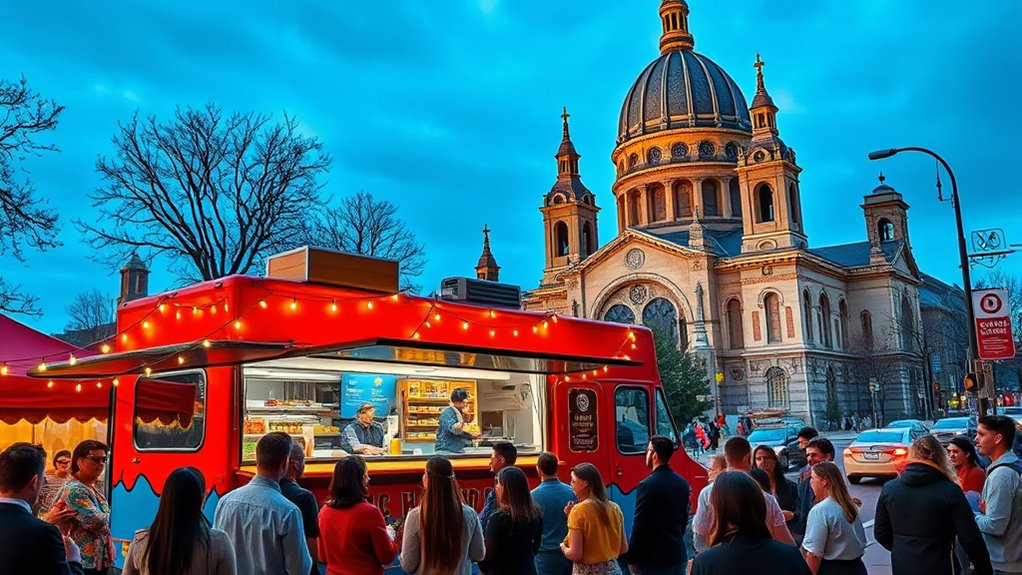
You can boost your visibility by targeting popular local event venues where crowds gather regularly. Customer loyalty programs encourage repeat business and help spread positive word-of-mouth. Combining these strategies will strengthen your presence in the St. Paul food scene.
Popular Local Event Venues
Partnering with popular local event venues is a powerful way to increase your food truck’s visibility and attract new customers in St. Paul. These venues draw large crowds enthusiastic to experience unique food options. To maximize your presence:
- Secure spots at farmers markets, festivals, or outdoor concerts to showcase your food truck branding.
- Offer menu innovation that aligns with event themes, enticing attendees to try your latest creations.
- Collaborate with event organizers to feature special menus or promotions.
- Use these opportunities to gather feedback, refine your offerings, and build a loyal customer base.
Customer Loyalty Programs
Implementing a customer loyalty program is a smart way to boost repeat business and strengthen your presence in St. Paul. Focus on loyalty program design that’s simple, engaging, and tailored to your customers’ preferences. Rewards system strategies should incentivize repeat visits without overextending your costs. For example, consider punch cards, digital points, or exclusive offers for loyal patrons. Make it easy for customers to participate and track their progress. The key is to create a system that encourages ongoing engagement while delivering value. By fostering loyalty, you’ll build a dedicated customer base that keeps coming back, spreading positive word-of-mouth in the local community. A well-crafted rewards program can differentiate your food truck and help sustain your growth in St. Paul.
Local Events Boost Visibility
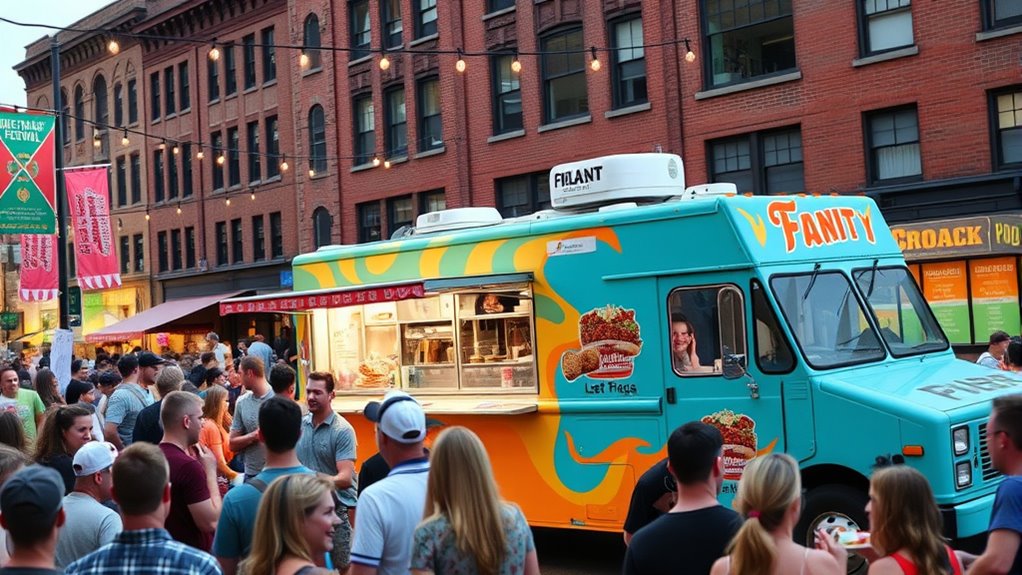
Have you noticed how local events in St. Paul can skyrocket your food truck’s visibility? Participating in these gatherings offers a perfect chance to enhance your food truck branding and boost social media engagement. Here’s what to focus on:
- Pop-up Festivals and Markets: These draw big crowds enthusiastic to try new vendors.
- Community Events: Be part of parades or charity runs to connect with locals.
- Food Truck Rodeos: Collaborate with other trucks for increased exposure.
- Seasonal Celebrations: Leverage holidays to create themed promotions.
Attending these events gets your brand seen and shared online, attracting more followers and customers. Use eye-catching signage and share live updates on social media to amplify your presence. The more active you are in local events, the more your food truck branding will resonate across the community.
Frequently Asked Questions
What Permits Are Required Specifically for Mobile Food Vendors in St. Paul?
You need to obtain food truck licensing and comply with mobile vendor regulations to operate legally in St. Paul. First, apply for a mobile food vendor license from the St. Paul Department of Safety and Inspections. You’ll also need a food handler’s permit, a health department inspection, and possibly a parking permit. Make sure to follow local regulations on signage, hours, and sanitation to keep your truck compliant.
How Do I Find the Best Locations for My Food Truck in St. Paul?
To find the best locations for your food truck, start with location scouting around busy spots like downtown, parks, and event venues. Consider customer demographics to target areas with your ideal clientele. Visit potential spots during peak hours to observe foot traffic and gauge demand. Use social media to gather feedback, and don’t hesitate to test different locations to see where your food resonates most with customers.
Are There Specific Health Codes Unique to St. Paul for Food Trucks?
You might be surprised, but St. Paul has specific health codes for food trucks. You’ll need to pass health inspections and follow licensing procedures that guarantee food safety standards are met. These requirements include proper food storage, sanitation, and equipment maintenance. To stay compliant, check with the St. Paul health department for the latest regulations, as they may have unique local rules you need to adhere to for operating legally and safely.
What Are the Most Popular Food Trends in St. Paul’s Food Truck Scene?
You’ll notice that innovative fusion dishes are trending in St. Paul’s food truck scene, blending flavors from different cuisines to excite customers. Plant-based options are also gaining popularity, attracting health-conscious and eco-friendly diners. People love trying creative, multicultural bites and veggie-centered meals. Stay ahead by offering unique fusion creations and expanding your plant-based menu, which will help you stand out and meet the evolving tastes of St. Paul’s vibrant food truck community.
How Can I Partner With Local Businesses or Events to Increase My Truck’s Visibility?
Did you know 78% of food trucks boost visibility through local collaborations? To grow your truck’s presence, partner with community events like festivals and markets. Reach out to local businesses for cross-promotions or sponsorships, which can attract new customers. By actively engaging in community events and building these partnerships, you’ll increase your visibility, gain loyal customers, and establish a strong presence in St. Paul’s vibrant food scene.
Conclusion
Starting a food truck in St. Paul is an exciting venture, and with the right planning, you’ll stand out in this vibrant scene. Don’t worry if you’re new to the city’s regulations—researching local requirements isn’t as intimidating as it seems. Just stay focused, keep your passion for food alive, and adapt along the way. Before you know it, you’ll be serving up delicious eats and building a loyal following in St. Paul’s bustling food community.


